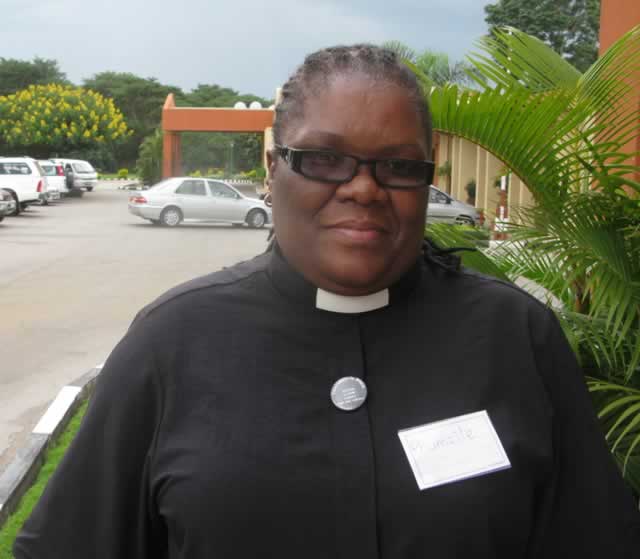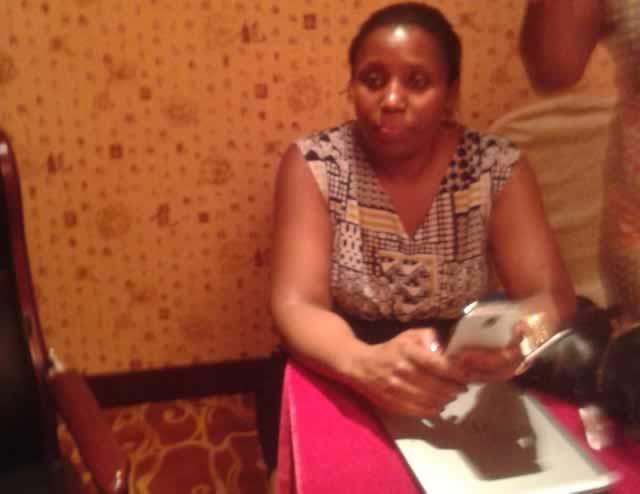In memory of all who passed on
They spoke of the departed loved ones, husbands, children, mothers, brothers, aunts and friends. Most of all, they gave thanks and glory to God for having responded to their plight and guided them to the day when ART was discovered.
“All I say is Ebenezaar,” said Magret Cement, who lost a husband.
“I am grateful that God carried me through up to this day when ART is now available. It was tough. I tested HIV positive in 1999 and lost my child the same year. I was ill and it’s by God’s grace that I am healthy today,” said Cement.
Cement said she cannot explain how she went on to have two more children under her status then when there was no prevention from mother to child transmission programmes.
Cement finds time every year to come together with her community and give thanks to God for bringing them this far.
“I do not fail to attend a candlelight memorial, for me it is the mercy and goodness of the Lord that I exalt,” said Cement.
Cement applauded many support groups that work in the communities nationally.
“Some people have asked why there are so many support groups. It is correct to say the many the better because each community then serves within its radius and is thus effective,” said Cement.
She added: “When I tested HIV positive, support groups were the only place one would find people with similar challenges and how to go about them.
“Then we urged each other to adopt nutritional eating and healthy living which meant not getting more cross infections.
Cement is a founder member of Chiedza Home of Hope in Glen View and they have trudged the tough road, but are glad that the outlook is now bearable.
“I am from one of the apostolic churches and am open about my status. I talk openly in the church and I have found that this is helpful. Many people have secretly sought advice which I have gladly offered and told them to know their HIV status,” she said.
Cement said that it is not every day that one’s problems are spiritual.
She said when one keeps getting ill he or she should be tested for HIV. These illnesses, she said, should no longer be taken care of kumasowe.
“I always tell my colleagues at my church that not every thing is spiritual, some problems are in the blood. A compromised immune system will not get back on track by only prayers, I am open about my status so it’s easy for me to approach anyone I see wasting away to get tested for HIV,” she said.
Another woman who is not HIV positive has seen it fit to join the support group in memory of the loved ones she lost. Mrs Cecilia Madzongo has seen the ugly face of HIV and has lost a son and relatives. This has left her with orphans under her care and she only got the kind of support she was looking for from Good Life in Budiriro. Mrs Madzongo is also a member of the apostolic church.
“I am a trained health delivery attendant. I am informed of delivering under today’s scenario. I always use gloves and if one is HIV positive and has been to the clinic I ask if they have taken their tablet, the nevirapine dosage. I then deliver the baby, cut the cord using a new blade and tie using the recommended way. After that we take the baby to the clinic for the baby’s nevirapine injection too,” she said in Budiriro at the candlelight memorial last week.
The South West South community has been receiving support from ZNNP+ for many years.
They have formed a foundation called Strategies for Hope. From this organisation they hope to cut their dependency.
Andrew Welton, who is the focal person for the district, said it is important for them to meet regularly, share skills and offer each other psycho-social support.
“We have different skills and it has become imperative to exchange. We have carpenters, builders, tailors and people who can bake wedding cakes.
“We have therefore come together and those interested be in poultry have gained the necessary skills free of charge. No one pays to get empowered so we find that a member in the group shares the knowledge one has with those who need it free of charge,” said Welton.
“We give each other support and hope. The new members need that very much. They are despaired and need to know that someone has walked the same path and made it after testing HIV positive,” he said.
Welton says one does not need to feel sorry or be in that state forever.
“Disclosure is a process, you just do not get the results and announce. It is one’s free choice to disclose or not. But disclosing to a spouse is a must because there is no way one can keep that a secret. Support groups help one to accept the new situation and learn to live with it,” he added.
Welton added that he has found a partner who is also HIV positive from the support group.
“I have found out that some of the problems couples who have different status face stem from fear. My partner and I intend to tie the knot sometime next year. You will be invited,” he said.
Welton said they are in the process of registering an organisation specifically to offer a half way home to those vulnerable and in need.
“We have seen that some people are rejected after testing HIV positive and have ended up on the streets and destitute. We plan to have a home for them where they will be taught skills. With skills one is able to move on and the home will be a halfway home as soon as one has reached self-sufficiency, they move on,” he added.
Welton said they also want to venture into mining and also register claims.
He said being HIV positive has made him find the inner person in him whom he was not aware of in the past.
Paidamoyo Magaya, who is the Advocacy and Communications Officer for ZNNP+, said that there were still barriers to implementing meaningful involvement of people living positively (Mipa). She said it is still difficult for some people to acknowledge their HIV status publicly. She wanted to see a scenario where more men are involved since today male involvement stands at 20 percent compared to 80 percent from women.
She added that surprising is that those who call people names do not even know their status and have never been tested. She also called for solidarity in PLHIV as this tearing each other down was bound to undo all the groundwork covered today. Magaya said with Mipa, one can rebuild self-worth, lead meaningful and positive lives. They can also demand their space and rights — access to health services, accommodation and education.
Some people have been treated badly or even demoted after disclosing their status because of the attitudes of employers towards HIV+ employees.
As we remember those who perished due to Aids related illnesses, may we have behaviour change as a cornerstone to reducing new HIV infections.








Comments